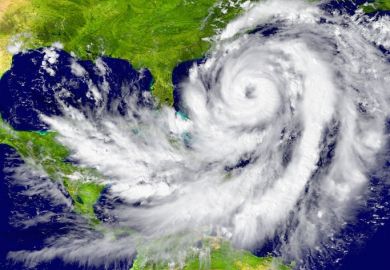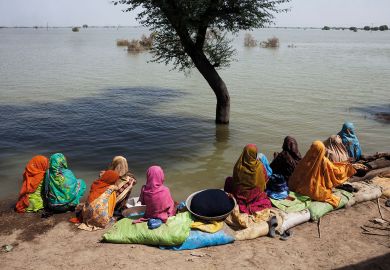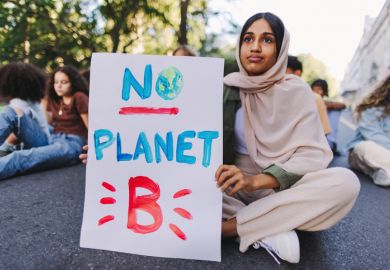Humanity’s response to the Covid-19 pandemic was commonly likened to national war efforts. Universities throughout the world, along with other key sectors of society, pivoted rapidly to address the crisis or even to explore the opportunities it engendered.
In contrast, I see our collective response to the climate crisis and the broader but interlinked sustainability crises as slow, muted and ineffective. Universities and other key sectors of society are largely adopting “business-as-usual” approaches, apathetically ignoring a litany of failures to meet sustainability and climate goals.
The Paris Agreement set the long-term goal of limiting global warming to 1.5oC above pre-industrial levels, on the grounds that climate-related risks for both natural and human systems would otherwise rise dramatically. In the past year, however, the global average temperature reached 1.1oC above that baseline, and the World Meteorological Organization now believes there is a 50 per cent chance that 1.5oC will be breached by the middle of the present decade – a couple of years from now.
There is, thus, broad consensus that a global human and ecological catastrophe could be precipitated in just handful of years, critically exacerbating sustainability challenges including water scarcity, hunger, health, poverty, economic growth, life on land and water, energy security and sustainable communities.
I appreciate that many of my colleagues in higher education are aware of these dangers and share my concerns. But can we honestly say that this has resulted in action? Do we as a sector practise what we preach, or are we too ready to blame a lack of scalable sustainable initiatives on the parsimony of politicians and the indifference of industry? What of our own responsibility?
While our research, memoranda and papers sound the alarm about the climate crisis, our deeds have largely failed to match our worthy words. We cannot continue as before; as academics, we should recognise that we have starring roles to play in this unfolding environmental tragedy, not bit parts.
Universities must cease to be exemplars of unsustainable practices and become the transformative enablers of sustainability for others. Our students and our partners in government, civil society and the private sector take their cues from our community, not just based on what we teach but, even more so, on what we do.
This is an enormous responsibility for us to assume and a unique opportunity for us to demonstrate our calling as enablers of change. The ball is in our court, and it is useful to ask ourselves how our actions in this moment of crisis will be remembered by our grandchildren.
So what can we do? My actions, as president of the King Abdullah University of Science and Technology (KAUST), have been to commit my university to net-zero carbon emissions, zero waste and zero wastewater. I am also hosting a major international sustainability congress, the Global Sustainability Development Congress, at the end of this month with Times Higher Education to discuss how universities must respond to the climate and sustainability crisis. We will explore these challenges across four broad themes: health and demography; sustainable energy and industry; sustainable environment; and sustainable cities and communities.
This three-day event will deliver an immersive, multi-track agenda, with more than 1,000 world leaders, investors and influencers present to share their insights into the challenges of converting goals into action and impact. It will recognise the urgent need for universities to be radical and rapid, addressing the issues at a greater scale than is currently happening.
My hope is that, by integrating thought-provoking panels with collaborative workshops, the event will deliver bold insights and enable delegates to forge powerful new alliances. In effect, I want the congress to be a call to action, an invitation to global universities to pivot their educational and research programmes towards tangible outcomes.
But while talk is necessary, it’s also cheap. We need to do more than research, debate and persuade – we need to act too. I expect all participants to come to the congress with a sense of urgency and to be willing to enable and act on much-needed change.
Universities cannot wait for the cavalry to arrive on climate change. We are the cavalry. It is time to charge.
Tony Chan is president of King Abdullah University of Science and Technology (KAUST). The Global Sustainable Development Congress 2023 will take place at KAUST from 29 May to 1 June. For more information, Click here to visit the event website.
Register to continue
Why register?
- Registration is free and only takes a moment
- Once registered, you can read 3 articles a month
- Sign up for our newsletter
Subscribe
Or subscribe for unlimited access to:
- Unlimited access to news, views, insights & reviews
- Digital editions
- Digital access to THE’s university and college rankings analysis
Already registered or a current subscriber?








